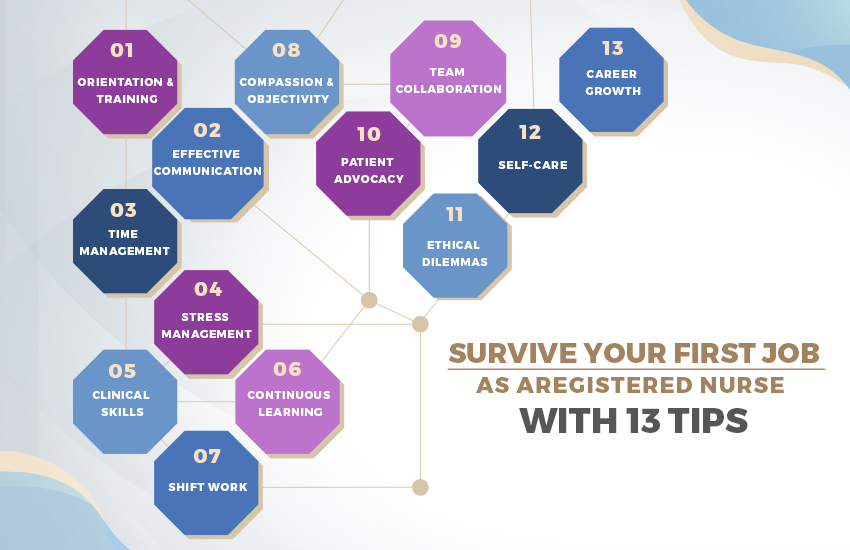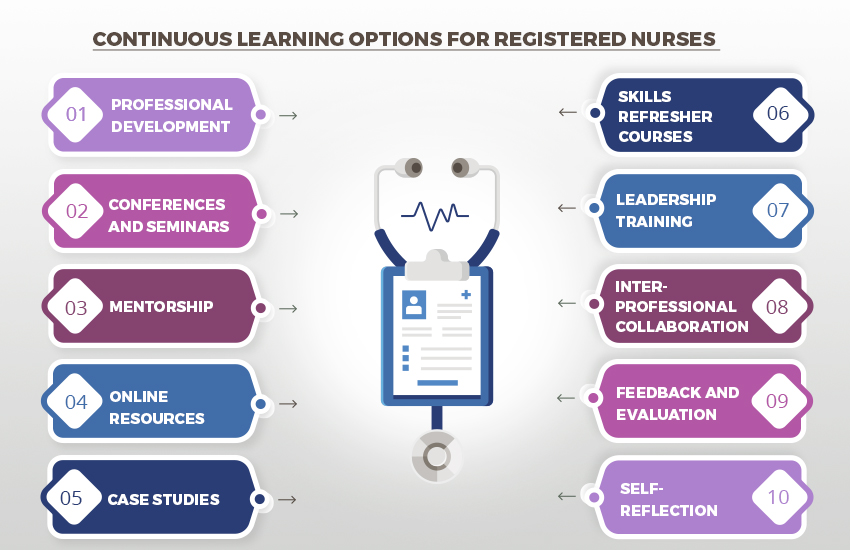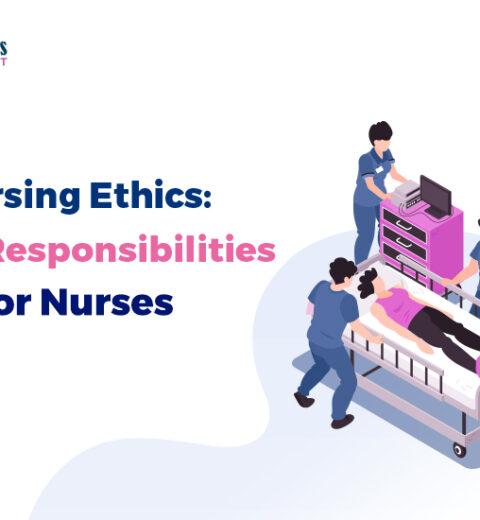Even while nurse advocates have discussed the need for smoother transitions for nursing students into the workforce in recent study, it is still true that these changes can be sudden. In the face of the difficulties of being a new nurse, seasoned nurses can offer insightful advice that may help new nurses not only survive but also thrive in their first year of direct practice. Here are 13 tips and recommendations that will help you survive your first job as a registered nurse.

The Initial Jitters on How to Survive your First Job as a Registered Nurse – 13 Tips to Overcome it
Starting any new job can be intimidating, especially in a field as demanding as nursing. It’s perfectly normal to feel nervous, but remember that your education and training have prepared you for this moment. Take a deep breath and focus on the journey ahead.
Take up your Orientation and Training Seriously
Most likely, orientation and training will take up your first few weeks. Make use of this opportunity to get to know the hospital or healthcare institution, its procedures, and the people you’ll be working with. Don’t be afraid to clarify things for yourself and ask inquiries.
Build Effective Communication
Effective communication is the cornerstone of nursing. Learn to listen actively and convey information clearly to colleagues and patients. Good communication enhances patient care and teamwork.
Manage Time Efficiently
Nursing can be fast-paced, and time management is crucial. Prioritize tasks, stay organized, and make use of available tools like scheduling software or checklists to ensure nothing is overlooked.
Handling Stress like an Ace
Nursing can be mentally and emotionally draining. Develop good stress coping techniques such as mindfulness, exercise, or conversing with coworkers. Remember that it’s alright to seek help when you need it.
Refining Clinical Skills
Your clinical abilities will develop more. Accept opportunities for skill growth and practice if you want to become a better nurse. Don’t be scared to seek mentorship or direction.

Embracing Continuous Learning
Medicine and healthcare are ever-evolving fields. Stay updated with the latest research and advancements. Consider pursuing certifications or further education to enhance your expertise.
Coping with Shift Work
Nursing often involves shift work, which can disrupt your circadian rhythm. Establish a sleep routine, maintain a healthy diet, and find strategies to adapt to irregular hours.
Balancing Compassion and Objectivity
Nursing requires both empathy and objectivity. Find a balance between caring for your patients emotionally and making objective decisions based on clinical evidence.
Team Collaboration
Nursing is a team effort. Foster positive relationships with your colleagues, as teamwork is essential for providing quality patient care.
Patient Advocacy
Advocate for your patients’ needs and rights. Be their voice when necessary and ensure they receive the best possible care.
Ethical Dilemmas
Nursing often involves ethical challenges. Familiarize yourself with the nursing code of ethics and consult with colleagues or supervisors when facing difficult decisions.
Prevention of Burnout and Self-Care
Nursing is an emotionally draining profession. Make self-care a top priority to avoid burnout. Take pauses, pursue hobbies, and seek help when necessary.
Career Growth and Networking
Nursing offers various career paths. Network with experienced nurses and explore opportunities for career advancement, such as specializing in a specific field or pursuing leadership roles.
Conclusion
In conclusion, your first job as a registered nurse is a momentous step, and it’s perfectly normal to have some butterflies in your stomach. Remember, it’s not just about surviving; it’s about thriving in this fulfilling career.
If you’re seeking exciting opportunities as a locum registered nurse in both NHS and private hospitals, we encourage you to explore the world of possibilities with JP Medical Recruitment Services. They specialize in adeptly matching skilled nurses with the right positions, ensuring a rewarding and impactful career. Take the next step in your journey by visiting their website and discovering the exciting opportunities that await you. Your dream job may be just a click away. Here’s to a successful and fulfilling career as a registered nurse!
FAQs
Is it normal to feel overwhelmed in my first nursing job?
Yes, it’s entirely normal to feel overwhelmed initially. With time and experience, you’ll become more confident in your role.
How can I improve my clinical skills as a new nurse?
Seek guidance from experienced colleagues, practice regularly, and consider additional training or certifications.
What should I do if I encounter ethical dilemmas in nursing?
Consult with senior nurses or supervisors and refer to the nursing code of ethics for guidance.
How do I prevent burnout in the nursing profession?
Prioritize self-care, set boundaries, and seek support when needed. Don’t hesitate to take time off if necessary.
What are the long-term career prospects for registered nurses?
Registered nurses have various career paths, including specialization, leadership roles, or advanced practice nursing. Networking and continuous learning can open up new opportunities.






